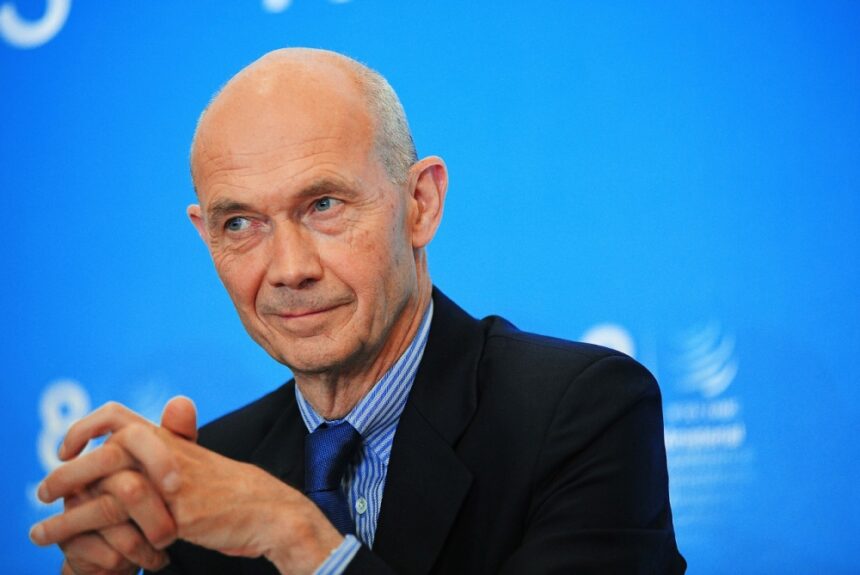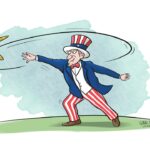By Ma Tong
Pascal Lamy, former director-general of the World Trade Organization (WTO), warned that the US administration’s tariff policies are built on “completely mistaken” diagnosis of its domestic economy, which will backfire by fueling US inflation and pushing its interest rates higher.
In a recent exclusive interview with the Global Times, Lamy, current Vice President of the Paris Peace Forum, said that the US protectionism will fail to achieve the aim of bring manufacturing back to the country and cutting its trade deficit. He also predicted that most international trade will “remain largely unaffected.”
Since taking office in January 2025, the new US administration has rolled out a series of tariff hikes targeting major trading partners such as China, Canada, Mexico, and the European Union (EU). This push peaked on Wednesday US time with broad new tariffs slapped on nearly all imported goods—a baseline 10 percent duty across the board and steeper rates for certain countries. The US move has triggered fierce backlash from its trade partners while sending global markets on a tailspin.
Flawed self-diagnosis
Lamy argued that the sweeping tariffs adopted by the Trump administration won’t work because they are built on a flawed assumption and completely mistaken diagnosis that the US economy is in bad shape—a key justification for the tariffs, and wrongly blames global trade for its domestic woes. “That is incorrect, and it’s the US society that’s struggling, which is a domestic issue with little connection to international trade,” Lamy said.
The persistent US trade deficit—hovering at 3 to 4 percent of the US’ GDP for three decades— stems from a structural imbalance between high consumption and lower production in the US economy itself, a gap easily financed by the dollar’s status as the world’s reserve currency, he explained. Similarly, he considers that the Chinese trade surplus is the result of an imbalance between high production and low consumption.
Lamy rejected the US framing of its major trade partners as the culprits “exporting too much” and “stealing prosperity” from the US. “That doesn’t make any sense,” he said.
Globalization has sped up market openings and competition in many sectors. It has hit the US society harder not because the US deindustrialization has been worse than elsewhere, but because the country lacks a proper social security system to match its economic size and per-capita income, Lamy said.
Limited global impact
The US government on Wednesday announced so-called “reciprocal tariffs” on imports from about 90 countries and regions. These new tariffs aim to “erase a trade deficit between the US and other countries,” ranging from China to the EU, which face rates of 34 percent and 20 percent, respectively, among others, according to reports from multiple US media outlets.
The US has already imposed tariffs on aluminum and steel imports and has increased duties on goods from China under the pretext of the fentanyl issue.
The former WTO chief downplayed the tariffs’ potential to reshape global trade, noting that the US accounts for just 15 percent of the world’s imports. “The rest of the international trading system – 85 percent of global imports, involving trade between countries like China, India, Mexico, and Canada – can remain largely unaffected,” he said.
Lamy cautioned that the US itself stands to suffer the most. “If the US triggers a trade war, it will primarily hurt the US economy by raising prices, driving inflation, and likely pushing up interest rates,” he said, adding that this fallout could also trigger pushback from the US financial market and the public.
However, Lamy pointed to the risk: If the US economy suffers, it could “drag down the world economy” due to the US dollar’s dominance and its financial markets, which have an outsized influence beyond their share of world trade.
“The combination of potential interest rate hikes from these trade measures and high debt levels in many nations is a very dangerous mix,” Lamy warned.
Shifting trade winds
The former WTO chief called on the involved parties to be open to fair and balanced negotiations, but predicting “If this fails, the affected economies like EU and China will retaliate to create a fair balance of power.”
If the US persists with levying more duties, Lamy foresees a global trade shift. Countries and investors may pivot away from the US, seeking opportunities in other markets like Latin America or Africa in the future.
The tariff disputes will delay investments, inevitably slowing the world economy. But overall, the global trend of looking to markets beyond the US will dominate, according to Lamy.
“People will look to grow domestic production and profit from exporting their comparative advantages,” he said. While this could slow global investment and economic growth in the short term, the broader trend will favor markets beyond the US.
Multilateral resilience
The EU has launched some countermeasures on US products, in response to the US levies on steel and aluminum imports, which the EU considers “unjustified, disruptive to transatlantic trade, and harmful to businesses and consumers,” read a release seen on the European Commission’s official website.
Lamy stressed that if WTO members work together to shield the multilateral system from contamination and stick to their rule-based obligations, it could spark a collective response from the global community against the US protectionism, bringing them geo-economically closer.
In a world of rising uncertainties, Lamy called on the EU, China and other countries to lead in tackling global challenges. The priority is to avoid contamination of the multilateralism by the US protectionist stance, preferably hanging together and without retreating into regional divides, Lamy noted.
“If protectionism is spreading – not just to the US, but to the rest of the global system, it would be very terrible news for many developing countries,” he added.













